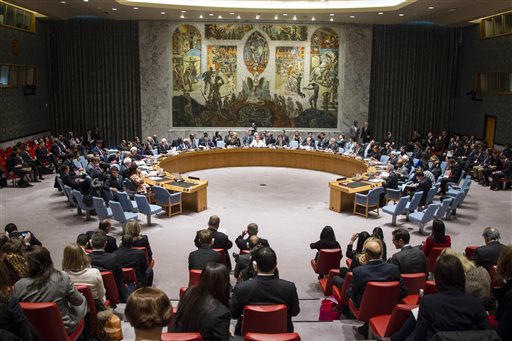UN urged to protect girls and women from rape in conflict

In this photo provided by UN Photo, the United Nations Security Council meets at the UN headquarters Monday, Jan 19, 2015 to discuss the maintenance of international peace and security. AP
UNITED NATIONS — A Somali woman who runs an organization helping victims of sexual violence urged the Security Council on Friday to step up action to prevent U.N. peacekeepers and staff deployed to conflict zones from becoming “violent perpetrators” themselves.
Ilwad Elman, speaking on behalf of many non-governmental organizations promoting human rights and gender equality, said the U.N.’s “zero tolerance” policy for sexual abuse must be reinforced by insisting on accountability for all perpetrators — and holding countries that contribute troops accountable for their crimes.
Elman also insisted on accountability for “atrocities” committed by all armed groups and security forces.
U.N. Assistant Secretary-General for Humanitarian Affairs Kyung-Wha Kang warned the council that “the scale and level of brutality and violence committed against civilians in armed conflict have continued to rise” — from Syria, Iraq, Yemen and Libya to the Central African Republic, Congo, Nigeria, South Sudan, Sudan, Ukraine and many other countries.
At the start of 2014, humanitarian organizations appealed for aid to help 52 million people in urgent need of assistance and protection, Kang said. “By the end of the year, the number had gone up by almost 50 percent to 76 million.”
Article continues after this advertisementThe overwhelming majority of those needing help now are civilians affected by conflict, and the majority are women and girls who continue to be “disproportionately affected by sexual violence,” she said
Article continues after this advertisementThe extremist group calling itself the Islamic State “has used and punished women to demonstrate their power” as the captured territory in Syria and Iraq, repeatedly raping women, forcing them into marriage and selling them into slavery, she said.
Nigerian women and girls have given “harrowing accounts of their experiences at the hands of Boko Haram,” Kang said, and in Afghanistan the number of women and girls killed or injured has continued to increase “at an alarming rate,” including in targeted attacks on women who are public figures and girls seeking an education.
Helen Durham, director for international law and policy at the International Committee of the Red Cross, said the single most important measure to reduce the targeting of women, children and non-combatants by warring parties is to ensure that governments and armed groups comply with their legal obligations under international humanitarian law to protect civilians.